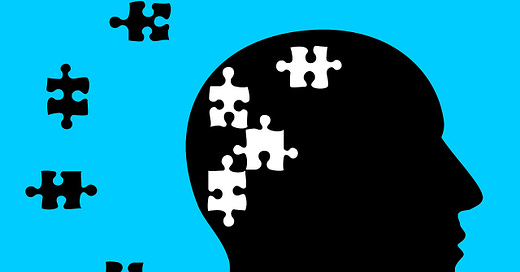“Depression brain” is a thing. Maybe you knew that; maybe you didn’t. Either way, we’re going to discuss mental illness and memory loss in this issue, and I’ve also included the introduction to my forthcoming book as an excerpt. (I nearly forgot to do that.) There’s a video greeting for you all—I’m wearing a black turtleneck and a fancy watch—and a bit of a rant about mental illness and worldview. Let’s go mental.
In the news
I take a lot of pride in my memory. I can remember exactly what someone ate at dinner several years ago, as well as their mannerisms, their comments, and whether they chewed with their mouth open. It’s a blessing and a curse—a blessing because I find my brain to be a pretty decent notebook and a curse because I sometimes find it difficult to emerge from the past and live in the present. Maybe this sounds familiar.
Last week the website The Conversation published an article entitled “People with depression can sometimes experience memory problems—here’s why.” It’s not long, and I encourage you to read it.
Basically, the gist is that “depression brain” is a real thing that really happens to people who experience depression. The article points out that three in five people with depression will battle cognitive impairments caused by “changes in our brain’s structure and function that happen because of depression.”
The article deals a lot with short-term memory loss, with which I can certainly identify. Then there’s the fact that “depression brains” have to work extra hard to compensate for cognitive difficulties, which only exacerbates exhaustion that is likely already out of control.
So are our brains permanently effed? Not necessarily. The article has some pretty obvious tips, but the big takeaway for me is that those missing pieces of my memory are missing for a reason, and not because I’m generally “scatterbrained,” or anything like that.
Memory is something we’ll no doubt be dealing with a lot in these newsletters. It’s a theme of the depression spectrum, and it also happens to be what I believe to be the most important device in literature. But that’s for me to geek out on.
Excerpt—So Old a Pain: Depression in Fragments, Introduction
I will start at the end, as that’s where it begins. And also because it doesn’t matter, and it simply occurred to me to do so. If there’s a better reason, I’ve yet to know of it. But one thing I’ve learned through all this is that it’s never as it seems. That is, it’s exactly what it seems and couldn’t possibly be more precise. Only it’s not. But it doesn’t matter, I’ve already said that, I can say whatever I want. Come to think of it, we can go through it all in whatever order you choose. I couldn’t care less. We can go from start to finish, which is really finish to start, only it isn’t, or we can hopscotch like Cortázari , from this place to that, from here to there or there to here, and I’ll even do one better: I won’t tell you where to go next. There’s always somewhere to go and someone telling you how to get there and I’m honestly quite tired of it all. Just tired, really. Come to think of it, we might as well go through it while you’re sleeping. Yes, that would be best, I think. Because that’s basically how I wrote it. Only it wasn’t.
Video
Mindful
Using mental illness to launder a reprehensible worldview is always very, very bad.
Now repeat it like Bart Simpson on the chalkboard: “Using mental illness to launder a reprehensible worldview is always very, very bad.”
But it’s happening in Winnipeg, where I live, amongst a creepy band of ding-dong global pandemic-deniers.
It recently came to my attention that in the next few days (I don’t want to share the day or time, I don’t know all of you, you might be weird) there will be a “Mental Health Awareness Rally” in front of the Canadian Museum for Human Rights at The Forks. It is anything but that. So don’t go there—unless it’s to counterprotest.
Speakers at this “rally” include that blockhead “pastor” of the Steinbach church that keeps getting fined as well as a “nurse” who purports to lead an organization called “Nurses Against Lockdowns Canada.” Oh, and a funeral director will speak as well, which is appropriate given that a number of these mask-less morons will probably need his services in the next few weeks.
This is an anti-lockdown event couched in mental health language, which is extremely insulting. Has the pandemic affected our mental health? Of course it has. Personally, I’ve swung from manic productivity to deep depression and self harm. Countless people will have similar stories, even those without previous mental health conditions. And it’s something we need to keep an eye on even after COVID-19 is well behind us.
That said, mental illness is neither a prerequisite nor consequence of worldviews that harm others and are generally disgusting. Now, does our mental health affect how we view social structures and political policies? Absolutely. But there’s a difference. I don’t need to be mentally ill to want to get out of lockdown; I don’t need to be mentally ill to favour a lockdown. It’s less a matter of mutual exclusivity, in this instance, than singular excuse-ivity, and I’m sorry, but that doesn’t fly.
Events like this exacerbate misunderstandings about mental health and cause outright mental illness stigmas. In other words, this “rally” is a contributing factor to actual mental illness. We are worse off because of it.






